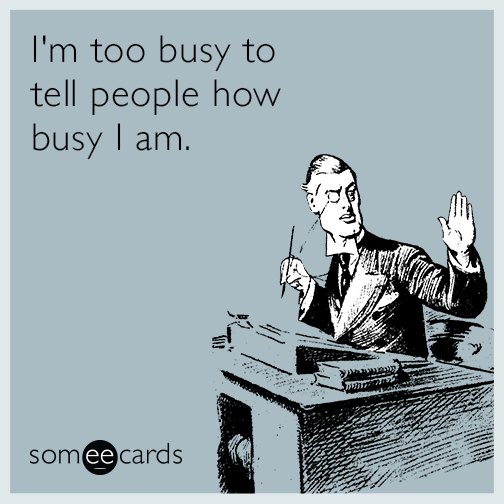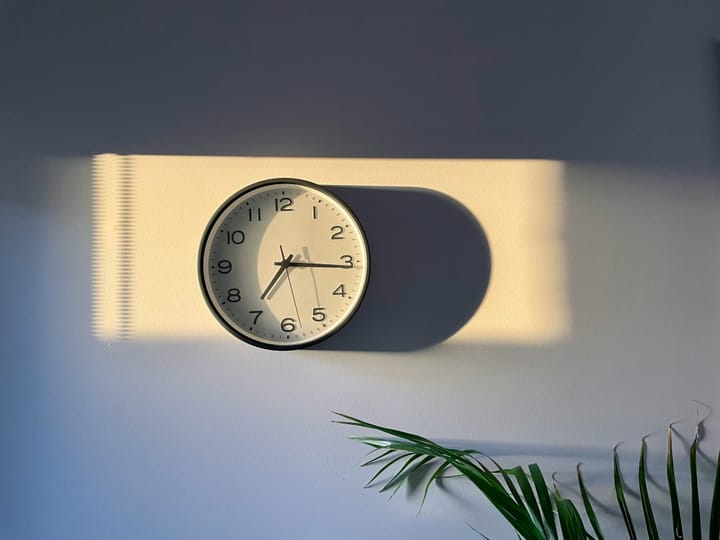Battling the Culture of Busy: An Introduction
Learn some questions to ask yourself to gain awareness about how you spend your time, and how that awareness can impact your day-to-day life.

As someone who generally has a jam-packed calendar each week, I often think about what it means to be busy, and how being ‘busy’ has become a way of life in our first-world culture. The word ‘busy’ has become such an important part of our daily narrative, as though we need to prove to each other just how important and full our lives really are.

One of the things that came out of the year my husband was going through cancer treatment was I spent a lot of time analyzing my life and what was important to me. There is nothing like watching the most important person in your life suffer a serious illness to make you re-evaluate your priorities. I am a planner by nature (part of my love of structure) but that year didn’t leave much room for plans or structure. Our life was dictated by how well Dana was feeling and we had to just roll with whatever came. This was hard for me, but it pushed me to be more present and take a good look at how ‘busy’ I was. As Dana recovered and I was able to add commitments back to my schedule, I thought a lot harder about what I was doing and why. I began to evaluate how the things I was committing to align with my values and priorities. I became more intentional.
I believe that being busy is a choice and that being intentional is the countermeasure to being busy.
Intentionality in Choice
While I don’t think there is anything wrong with leading a full life, I think that there needs to be awareness around what that means for your physical health, mental well-being, and your relationships with people you care about. Every single part of our lives is made up of choices. Our careers, our partners, our friends, and our families are all things that we choose to have in our lives. Don’t get me wrong, some are not easy choices. Some are incredibly difficult choices. But they are choices nonetheless.
I don’t mean to imply that we have complete control over everything that happens in our lives because we don’t (though control freaks like me would really prefer if we did). We do, at least to some extent, have a choice about how we react/handle/approach the things that get thrown at us.
Here are some examples of different types of ‘busy’ that I hear often:
- I work a 60-hour work week.
- I meet my sister for lunch regularly, even though she always makes me feel bad about myself.
- I enrolled my 4 kids in 10 different after-school activities and spend every waking hour driving them to things.
- I signed up for 5 different sports leagues with games that start at 10 pm and I am tired all the time.
- I am on 3 boards with 5 sub-committees and don’t see my friends enough.
These are all perhaps a bit exaggerated, and I am guilty of complaining about at least 3 of them, but my point is that each one of these things has a reason behind why someone made the choice to do them. The real questions are:
Is it a good reason and was the choice made with intentionality?
I am not saying that you should deprive your kids of extracurricular activities or cut your sister out of your life, but I am saying that when you commit your time (and energy) to something:
- Are you thinking about how it will impact you?
- Are there tactics you can use to help you manage your time better?
- Do you really need to be so ‘busy’?
Being ‘busy’ ends up being a question of self-care. It’s about ensuring that you have the resources to be your best self by questioning and reflecting on how you spend your time.

Like any battle, you will not necessarily always win. The ‘culture of busy’ is a persuasive one that sucks you into its vortex. I still, despite my constant efforts at awareness, regularly find myself looking at my week wondering how I managed to book so many commitments. That said, I also regularly make choices to adjust/reschedule things to help manage my self-care.
I think it is totally ok to be busy. It is even ok to complain about it a little to your friends and family. But possess the awareness that being busy is a choice and you have the power to make a change. Life isn’t a competition to see who is the most exhausted. You can choose to take time for yourself and add or remove things from your schedule. While some of those choices will certainly have consequences, it is important to know that you don’t have to just accept the status quo.
Share
Ashley Janssen

Productivity consultant, writer, speaker, serial entrepreneur, chaos calmer, introvert, cat-lady. Lover of books, fitness, old fashioned’s, basketball, and video games.
Follow me on
Twitter
or
LinkedIn.
Hire me for
1 on 1 productivity consulting
or
speaking.
Related articles

Why Are You Productive For "Only" 5-6 Hours Each Day?

When You Do Things Matters


Comments ()